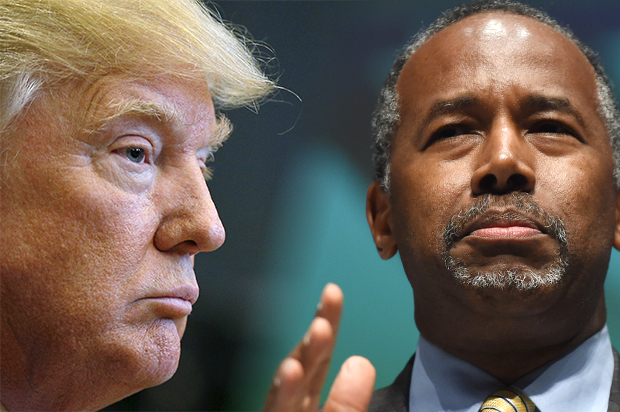At this moment, the top two contenders for the Republican presidential nomination are, according to national polls, Donald Trump and Ben Carson. Neither of the two has ever held elected office, nor did they have any significant political experience before launching their 2016 campaigns. But Republican primary voters are apparently in an aggressively anti-establishment mood and, for the time being, Trump and Carson are the preferred vessels for that sentiment.
One characteristic the two men share that has helped propel their respective candidacies is their determination to not be “politically correct.” Trump’s campaign is powered by the media attention he draws by saying racist, sexist, and otherwise outlandish things, and when he’s called out or criticized by the press for being an oafish lout, he brushes those complaints aside as the whining of the PC police. “I think the big problem this country has is being politically correct,” he said at the Fox News debate, to raucous applause from the audience.
Carson’s entire political identity is centered around his willingness to defy political correctness and “say what needs to be said,” whether it be comparisons of Obamacare to slavery, or descriptions of the international Marxist conspiracy to undermine the United States through gay marriage. He has a talent for taking any issue and reducing it to a question of political correctness. “We’ve gotten into this mindset of fighting politically correct wars,” he said at the August 6 debate when asked if he’d bring back torture as president. “There is no such thing as a politically correct war.”
Given the longstanding conservative fixation on the evils of political correctness, one would assume that having not one, but two presidential frontrunners who radiate un-PC-ness would be a cause for celebration. For years now, Fox News programs and talk radio airwaves have been saturated with sneering reports about diversity measures on college campuses and school curricula that promote tolerance and the WAR ON CHRISTMAS. “Political correctness” has been built up by conservative pundits and activists as something approaching an existential threat to the conservative movement and the entire country. Now voters are acting on that concern and uniting behind the two candidates who best embody the anti-PC push.
But not everyone is happy with the ugly reality of what a non-politically correct GOP frontrunner looks like. CNN contributor S.E. Cupp wrote a column last week trying to explain why Donald Trump’s popularity has endured, even as he’s gleefully insulted women, Mexicans, Asians, and pretty much everyone else. As Cupp sees it, Trump’s popularity is all liberals’ fault because they’ve forced all this political correctness on us, and now fed-up conservatives are seeking refuge in Trumpism:
The new era of liberal political correctness — in which colleges designate “free speech zones,” words like “American” and “mother” are considered discriminatory, and children are suspended from school for firing make-believe weapons — has reached critical mass. If not for the loony sensitivities foisted upon us by the left, someone like Trump would be immediately dismissed as unprofessional and unserious, an incoherent blurter. Instead, he’s the equally extreme response to extreme correctness — if everything is offensive in Liberalville, then nothing will be offensive in Trumpland.
This is a wild misdiagnosis of what’s keeping Trump afloat. Undoubtedly there’s a strong current of cultural resentment flowing through the Trump coalition, but it has less to do with hypersensitive academics than it does the perception that the America that Trump supporters once knew is being lost. As Andrew Rosenthal writes, the “political correctness” argument animating the Trump surge is “rooted in the culture of white outrage, which in turn is based on the idea that efforts to win equal rights for minorities, women, gay, lesbian, bisexual and transgender Americans and others have somehow resulted in discrimination against white people.” Trump speaks to the poisonous sexism and casual racism of decades past when you could crack a joke about how Asians talk funny or dismiss a woman’s viewpoint as “hormonal” and be reasonably confident that no one would raise an eyebrow in protest. The Washington Monthly’s Ed Kilgore put it succinctly when he described Trump and Carson as “apostle[s] for the Church of the Day Before Yesterday, when America was never wrong and dissenters kept their mouths shut.”
Trump is hardly the first person to capitalize on this sentiment within the conservative movement. If you comb through Rush Limbaugh’s career you’ll find bits and routines that are very similar what Trump has been doing on the campaign trail. Trump and Carson are not the first candidates to make a war on political correctness a campaign theme – remember Rick Perry complaining that gays are serving in the military but kids “can’t celebrate Christmas or pray in school”? But Trump’s success as an anti-PC candidate is causing some more practical conservatives heartburn as they start to realize that his enduring popularity tarnishes the Republican brand and exposes some real ugliness in their own ranks.

